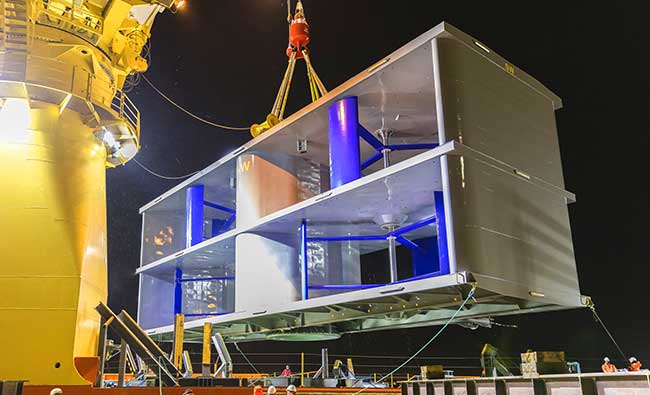In some exciting news, France is going with the flow on tidal energy. Ocean Energy Europe is celebrating the recent announcement from the French government, which pledged substantial funding of at least €65 million and revenue support for the groundbreaking tidal energy pilot farm, Flowatt.
This revelation, which was made by Agnès Pannier-Runacher, the Minister for Energy Transition, marks a significant milestone in France’s tidal energy sector. The forward-thinking move also sets a good example for other EU Member States to emulate.
As it unfolds, FloWatt is poised to become the largest tidal farm globally, boasting an impressive number of turbines and the highest capacity. This undoubtedly solidifies its status as a true flagship project.
This declaration showcases France’s strong belief in the potential of tidal energy, seeing it as not only an industrial prospect, but also a crucial component of the nation’s energy transition.
This decision is timely, given the growing developments and investments in ocean energy in the US and China. It also aligns with the big effort at the EU level to boost Europe’s supply of electricity through enhanced indigenous production.
The political momentum surrounding ocean energy has surged in recent years, driven by the EU’s goal of achieving 40 GW of ocean energy by 2050 and the introduction of a new target for innovative renewables in the 2023 EU Renewable Energy Directive. Additionally, the recognition of ocean energy as a strategic Net Zero technology has further fueled this progress.
Now, it’s imperative for Member States to transform this momentum into tangible action by implementing large-scale ocean energy projects, which can yield substantial benefits both domestically and internationally.
France’s inaugural tidal pilot farm, scheduled to commence operations in 2026, will provide sustainable electricity to meet the needs of 20,000 individuals for a period of 20 years. This ambitious endeavor, named FloWatt, is the result of a strategic partnership between Qair, the project developer, HydroQuest, the technology developer, and Constructions Mécaniques de Normandie (CMN), the industrial partner.
Drawing on the success of a two-year test program in Paimpol-Bréhat, the project will feature seven 2.5 MW turbines. These turbines will be strategically positioned in one of the world’s most powerful tidal locations, Normandy’s Raz Blanchard.
Ocean Energy Europe’s CEO, Rémi Gruet, expressed immense excitement in response to the news, citing that, “This is of huge significance: we have been waiting for revenue support for new pilot farms since the first were put in the water in 2016. Investors keep knocking on the door, but the lack of market visibility – provided by targets and finance – kept pushing them away.”
Rémi Gruet also emphasized “This commitment by the French government brings the number of countries supporting tidal energy revenues and installations to four, after the UK, China, and Canada. Other EU Member States need to take heed if Europe is to secure its supply of indigenous, low-cost electricity and avoid further energy crises.”
In conclusion, the decision of France going with the flow on tidal energy is a pivotal moment in the global quest for sustainable energy solutions. The investment of €65 million and revenue support for Flowatt technology exemplify the nation’s determination to lead the charge towards a cleaner, greener, and more sustainable future.
Citation
